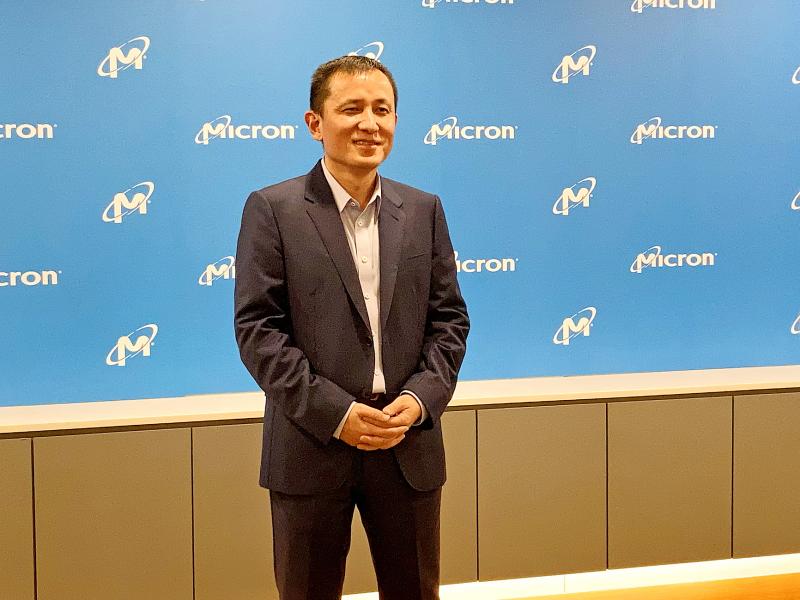US memorychip maker Micron Technology Inc yesterday said it plans to add about 2,000 employees to its Taiwanese operations within the next two to three years, as it seeks to ramp up some of the most advanced DRAM manufacturing technologies, including its 1-gamma nanometer node DRAM process in 2024.
The hiring would result in a 20 percent expansion of its Taiwan staff, which currently comprises about 10,000 workers.
The hiring drive would make Micron the largest foreign employer in Taiwan, corporate vice president and new head of Micron Taiwan Donghui Lu (盧東暉) told a news conference in Taichung.

Photo: Lisa Wang, Taipei Times.
Unveiling the company’s technology road map, Lu said one of his priorities is to accelerate tech deployment in Taiwan, including ramping up 1-beta nanometer node DRAM production by the end of this year and 1-gamma nanometer node DRAM in 2024.
The two processes would be the most advanced DRAM technologies when they enter mass production, Lu said.
To facilitate the 1-gamma nanometer node process, the chipmaker plans to create a “research and development corridor” and a research team dedicated for the technology at Micron’s new Taichung fab, A3, using extreme-ultraviolet (EUV) tools, Lu said.
Micron has started construction of A3 in 2019 and is installing manufacturing equipment in preparation for mass production.
Micron believes it is the right time to introduce EUV for the production of 1-gamma nanometer technology, as Taiwan Semiconductor Manufacturing Co (TSMC, 台積電), Samsung Electronics Co and Intel Corp have adopted the tools over the past few years, leading to better equipment availability and a mature ecosystem, Lu said.
“That will allow us to have the best combination of cost, technology and performance,” Lu said.
Micron plans to adopt the EUV tools for the next three generations of DRAM processes including 1-gamma, 1-delta and 1-epilson technologies, to make a better return from the investment in EUV equipment, he said.
In addition, accelerating its pace in growing the local semiconductor industry, EUV supply chains is also one of Lu’s priorities by increasing adoption of local manufacturing equipment and materials, he said.
A comprehensive supply chain can help shorten production cycles and improve cost efficiency, especially as transportation costs skyrocketed during the COVID-19 pandemic, he added.
“Taiwan has built the most extensive EUV ecosystem. No other place in the world can compare,” he said.
Commenting on the industry’s recent weakness amid geopolitical tensions and the pandemic, Lu said it might see short-term supply-demand imbalance, but Micron is bullish about the industry’s long-term outlook, as accelerating digitalization worldwide is driving demand for memory chips.
Micron plans to focus on rapidly growing markets, including the automotive electronics, industrial devices and data centers, to deliver stable gross margin, Lu said.

‘SWASTICAR’: Tesla CEO Elon Musk’s close association with Donald Trump has prompted opponents to brand him a ‘Nazi’ and resulted in a dramatic drop in sales Demonstrators descended on Tesla Inc dealerships across the US, and in Europe and Canada on Saturday to protest company chief Elon Musk, who has amassed extraordinary power as a top adviser to US President Donald Trump. Waving signs with messages such as “Musk is stealing our money” and “Reclaim our country,” the protests largely took place peacefully following fiery episodes of vandalism on Tesla vehicles, dealerships and other facilities in recent weeks that US officials have denounced as terrorism. Hundreds rallied on Saturday outside the Tesla dealership in Manhattan. Some blasted Musk, the world’s richest man, while others demanded the shuttering of his

ADVERSARIES: The new list includes 11 entities in China and one in Taiwan, which is a local branch of Chinese cloud computing firm Inspur Group The US added dozens of entities to a trade blacklist on Tuesday, the US Department of Commerce said, in part to disrupt Beijing’s artificial intelligence (AI) and advanced computing capabilities. The action affects 80 entities from countries including China, the United Arab Emirates and Iran, with the commerce department citing their “activities contrary to US national security and foreign policy.” Those added to the “entity list” are restricted from obtaining US items and technologies without government authorization. “We will not allow adversaries to exploit American technology to bolster their own militaries and threaten American lives,” US Secretary of Commerce Howard Lutnick said. The entities

Minister of Finance Chuang Tsui-yun (莊翠雲) yesterday told lawmakers that she “would not speculate,” but a “response plan” has been prepared in case Taiwan is targeted by US President Donald Trump’s reciprocal tariffs, which are to be announced on Wednesday next week. The Trump administration, including US Secretary of the Treasury Scott Bessent, has said that much of the proposed reciprocal tariffs would focus on the 15 countries that have the highest trade surpluses with the US. Bessent has referred to those countries as the “dirty 15,” but has not named them. Last year, Taiwan’s US$73.9 billion trade surplus with the US

Prices of gasoline and diesel products at domestic gas stations are to fall NT$0.2 and NT$0.1 per liter respectively this week, even though international crude oil prices rose last week, CPC Corp, Taiwan (台灣中油) and Formosa Petrochemical Corp (台塑石化) said yesterday. International crude oil prices continued rising last week, as the US Energy Information Administration reported a larger-than-expected drop in US commercial crude oil inventories, CPC said in a statement. Based on the company’s floating oil price formula, the cost of crude oil rose 2.38 percent last week from a week earlier, it said. News that US President Donald Trump plans a “secondary